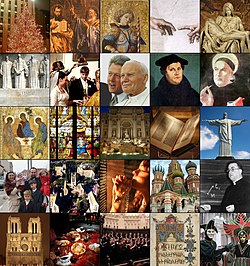| Part of a series on |
| Christian culture |
|---|
 |
| Christianity portal |
| Part of a series on |
| Protestantism |
|---|
 |
|
|
Protestant culture refers to the cultural practices that have developed within Protestantism. Although the founding Protestant Reformation was a religious movement, it also had a strong impact on all other aspects of life: marriage and family, education, the humanities and sciences, the political and social order, the economy, and the arts.[1][2]
Protestantism has promoted economic growth and entrepreneurship, especially in the period after the Scientific and the Industrial Revolution.[3][4] Scholars have identified a positive correlation between the rise of Protestantism and human capital formation,[5] work ethic,[6] economic development,[7] the rise of early experimental science,[8][9][10] and the development of the state system.[11]
- ^ Karl Heussi, Kompendium der Kirchengeschichte, 11. Auflage (1956), Tübingen (Germany), pp. 317–319, 325–326
- ^ The Protestant Heritage, Britannica
- ^ Cantoni, Davide (2015). "The Economic Effects of the Protestant Reformation: Testing the Weber Hypothesis in the German Lands". Journal of the European Economic Association. 13 (4): 561–598. doi:10.1111/jeea.12117. hdl:10230/11729. ISSN 1542-4766. JSTOR 24539263. S2CID 7528944.
- ^ Bendix, Reinhard (1978). Max Weber: An Intellectual Portrait. University of California Press. p. 60. ISBN 978-0520031944.
- ^ Boppart, Timo; Falkinger, Josef; Grossmann, Volker (1 April 2014). "Protestantism and Education: Reading (the Bible) and Other Skills" (PDF). Economic Inquiry. 52 (2): 874–895. doi:10.1111/ecin.12058. ISSN 1465-7295. S2CID 10220106. Archived (PDF) from the original on 2022-10-09.
- ^ Schaltegger, Christoph A.; Torgler, Benno (1 May 2010). "Work ethic, Protestantism, and human capital" (PDF). Economics Letters. 107 (2): 99–101. doi:10.1016/j.econlet.2009.12.037. Archived (PDF) from the original on 2022-10-09.
- ^ Spater, Jeremy; Tranvik, Isak (1 November 2019). "The Protestant Ethic Reexamined: Calvinism and Industrialization". Comparative Political Studies. 52 (13–14): 1963–1994. doi:10.1177/0010414019830721. ISSN 0010-4140. S2CID 204438351.
- ^ Cohen, I. Bernard (1990). Puritanism and the rise of modern science: the Merton thesis. New Brunswick, New Jersey: Rutgers University Press. ISBN 978-0-8135-1530-4.
- ^ Cohen, H. (1994). The scientific revolution: a historiographical inquiry. Chicago: University of Chicago Press. pp. 320–321. ISBN 978-0-226-11280-0. Google Print, pp. 320–321
- ^ Ferngren, Gary B. (2002). Science and religion: a historical introduction. Baltimore, Maryland: Johns Hopkins University Press. p. 125. ISBN 978-0-8018-7038-5. Google Print, p.125
- ^ Becker, Sascha O.; Pfaff, Steven; Rubin, Jared (2016). "Causes and Consequences of the Protestant Reformation". ESI Working Paper 16–13. ISSN 2572-1496.
